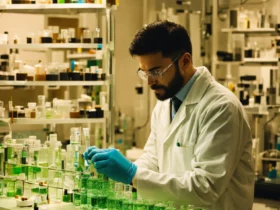Holistic Healing: Understanding the Role of Alternative Medicine in Modern Healthcare
In recent years, there has been a growing interest in alternative approaches to healing and healthcare, as more people seek out holistic and natural remedies for a wide range of health issues. This shift towards alternative medicine reflects an increasing desire for a more comprehensive and integrated approach to wellness, one that addresses the physical, emotional, and spiritual aspects of health. This approach is known as holistic healing, and it is quickly gaining recognition as an important component of modern healthcare.
Holistic healing is based on the principle that the body has the natural ability to heal itself when given the right support. This approach focuses on treating the whole person rather than just the symptoms of a specific ailment. It takes into account the interconnectedness of the mind, body, and spirit, and seeks to address the root cause of health issues rather than just the surface symptoms. This can involve a wide range of techniques and practices, including herbal medicine, acupuncture, chiropractic care, meditation, and energy healing, among others.
One of the key benefits of holistic healing is its focus on prevention and proactive wellness. Instead of waiting for symptoms to arise and then treating them with medication, holistic healing aims to prevent illness by promoting overall health and balance. This can involve making lifestyle changes, such as adopting a healthy diet, getting regular exercise, and managing stress, in order to support the body’s natural healing processes. By taking a proactive approach to wellness, individuals can reduce their risk of developing chronic conditions and improve their overall quality of life.
Another important aspect of holistic healing is its emphasis on individualized care and personalized treatment plans. Because holistic medicine takes into account the unique needs and experiences of each person, practitioners work closely with their patients to develop treatment plans that are tailored to their specific health concerns and goals. This personalized approach can lead to more effective and sustainable results, as it addresses the underlying causes of health issues and empowers individuals to take an active role in their own healing process.
In recent years, there has been a growing body of research supporting the effectiveness of various holistic healing modalities. Studies have shown that practices such as acupuncture, meditation, and herbal medicine can have tangible benefits for a wide range of health issues, from chronic pain and anxiety to digestive disorders and autoimmune conditions. As a result, more healthcare providers are incorporating these approaches into their practices, and many hospitals and medical centers now offer holistic healing services alongside traditional medical treatments.
As the demand for holistic healing continues to grow, it is important for individuals to be informed about the different options available to them and to work with qualified practitioners who have the knowledge and expertise to provide safe and effective care. Additionally, it is crucial for healthcare providers to recognize the value of holistic healing and to seek out opportunities for collaboration and integration with traditional medical approaches. By working together, practitioners of all backgrounds can help to create a more comprehensive and patient-centered model of healthcare that fosters healing on all levels.
In conclusion, holistic healing plays an important role in modern healthcare by offering a more comprehensive and integrated approach to wellness. By focusing on the whole person and addressing the root causes of health issues, holistic medicine can provide individuals with effective and sustainable solutions for their health concerns. As the field of holistic healing continues to evolve and gain recognition, it is important for both individuals and healthcare providers to understand its potential and to work together to create a more holistic and patient-centered model of healthcare.







Leave a Reply